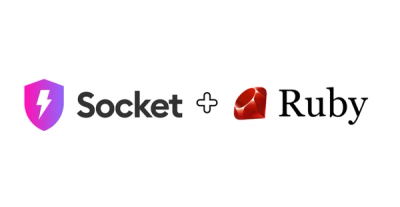
Product
Rubygems Ecosystem Support Now Generally Available
Socket's Rubygems ecosystem support is moving from beta to GA, featuring enhanced security scanning to detect supply chain threats beyond traditional CVEs in your Ruby dependencies.
browser-monkey
Advanced tools
Reliable DOM testing
npm install browser-monkey
Browser Monkey is a DOM assertion library. It helps you write framework agnostic browser tests that are reliable in the face of asynchronous behaviours like animations, AJAX and delayed rendering. It also helps you to write tests that exhibit the semantic meaning of the page, as opposed to a jumble of CSS selectors.
describe('admin', function () {
// describes the admin panel, with a search box, results and a user editor
var adminPanel = browser.extend({
searchUsers: function () {
return this.find('.search');
},
userResult: function (name) {
// find a user in the results by their name
return this.find('.results .user', {text: name});
}
userEditor: function () {
// return the user editor, scoped to the .user-editor div.
return userEditor.scope(this.find('.user-editor'));
}
});
// describes the user editor, with inputs for name and email, and a save button.
var userEditor = browser.extend({
name: function () { this.find('.name'); },
email: function () { this.find('.email'); },
save: function () { this.find('.save'); },
});
it('can search for, edit and save a user', function () {
return adminPanel.searchUsers().typeIn('bar').then(function () {
return adminPanel.userResult('Barry').click();
}).then(function () {
var userEditor = adminPanel.userEditor();
return Promise.all([
userEditor.name().typeIn('Barry Jones'),
userEditor.email().typeIn('barryjones@example.com')
]).then(function () {
return userEditor.save().click();
});
}).then(function () {
// verify that the user was saved
// use mockjax-router!
});
});
});
The API is made up of three concepts: scopes, actions and assertions.
find(css) and containing(css), that progressively narrow the scope of elements to be searched for. These queries return new scopes.click() and typeIn(text) wait for the scope to be found before simulating a UI event. These return promises that resolve when the event has been dispatched.shouldExist() and shouldHave(properties) can be made on scopes to ensure that they exist or contain text, classes or other properties.All scope chains are immutable, so you can reuse portions of a scope chain to build new chains:
var details = browser.find('.details'); // finds .details
var name = details.find('.name'); // finds .details .name
var email = details.find('.email'); // finds .details .email
...
The API starts with the browser scope, which contains everything on the page.
You can also create DSLs for components on the page using scope.extend(methods). By extending a scope, you can add methods that represent elements of the component at a higher level than mere CSS selectors. It's probably worth noting that these methods should normally just return scopes and not perform actions or assertions.
var innerScope = scope.find(css, [options]);
Returns a new scope that matches css.
css - css to find in the scopeoptions.text - text to find in the scope.var scope = scope.containing(css, [options]);
Ensures that the scope contains the css and options.text, the scope returned still refers to the outer scope.
css - css to find in the scopeoptions.text - text to find in the scope.FAQs
reliable dom testing
The npm package browser-monkey receives a total of 238 weekly downloads. As such, browser-monkey popularity was classified as not popular.
We found that browser-monkey demonstrated a not healthy version release cadence and project activity because the last version was released a year ago. It has 2 open source maintainers collaborating on the project.
Did you know?

Socket for GitHub automatically highlights issues in each pull request and monitors the health of all your open source dependencies. Discover the contents of your packages and block harmful activity before you install or update your dependencies.

Product
Socket's Rubygems ecosystem support is moving from beta to GA, featuring enhanced security scanning to detect supply chain threats beyond traditional CVEs in your Ruby dependencies.

Research
The Socket Research Team investigates a malicious npm package that appears to be an Advcash integration but triggers a reverse shell during payment success, targeting servers handling transactions.

Security Fundamentals
The Socket Threat Research Team uncovers how threat actors weaponize shell techniques across npm, PyPI, and Go ecosystems to maintain persistence and exfiltrate data.